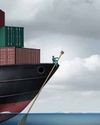Introduced to facilitate quick movement of containers, CFSs should become more transparent, customer-focussed and a value added facility to serve the trade better.

In the last few months some developments have taken place that has left CFS investors on a bit untrodden path. The Union Cabinet has already hinted that proposed amendments are being contemplated with regard to the age-old Multi Modal Transportation of Goods Act, 1993, to augment transparency in the EXIM logistics sectors and to discourage CFSs from inflating bills for importers, in particular.
So how and when it emerged Container trade is largely done on CY-CY (container yard-to-container yard) basis, which means the outward journey of a container starts with the delivery of a consignment to the shipping liner at a container yard in exporting country and the trade cycle ends with the delivery of cargo to the consignee at a container yard in import country.
Explaining the origin of CFSs, Capt. Vivek Singh Anand, President, MANSA said, “The ideal practice should be a container needs to be delivered to a liner’s account at the port so that it could be moved directly to the Customsbonded container yard inside the port, and similarly in the case of an import container the importers should have been able to receive the container at the port and move it to his factory. Since ports like JN Port don’t have such facility, it led to the establishment of off-dock CFSs which were located outside the port area, and at last count total number has gone up in excess of 31 CFSs.”
In 2010, the then Union Government had chalked out a plan to use land available with major ports to put to use for cargo related activity, but later it was shelved. The plan was again revived in 2014. While public sector ports are yet to develop on-dock container yards, the situation is no different at major private ports.
This story is from the {{IssueName}} edition of {{MagazineName}}.
Start your 7-day Magzter GOLD free trial to access thousands of curated premium stories, and 9,000+ magazines and newspapers.
Already a subscriber ? Sign In
This story is from the {{IssueName}} edition of {{MagazineName}}.
Start your 7-day Magzter GOLD free trial to access thousands of curated premium stories, and 9,000+ magazines and newspapers.
Already a subscriber? Sign In

Impact Of Covid-19 On Shipping And Logistics
Industry stalwarts discuss threadbare the prevailing logistics and supply chain scenario and issues in clearing cargo during the COVID-19 lockdown

Digital Platforms Defy Lockdown
Digital trading modules such as eNAM are enabling farmers to move their produce from farm to market even during the lockdown

GARMENT TRADE TRAMPLED
As retailers face a shutdown in US and Europe, the cascading affect has caused mass cancellation of orders in Bangladesh

TRADE RESUMES WITH CHINA
While India has allowed uninterrupted movement of imports into Nepal even during lockdown, China is reopening its borders as it emerges from the pandemic
LESS HUMAN INTENSIVE, MORE DATA DRIVEN
AI provides transformational opportunity for logistics industry by improving customer experience, operational efficiency, faster turnaround time and lower cost while ensuring security and transparency. Macro environment requires industry to transform to be less human intensive, agile and data driven, all of which can be accelerated by AI adoption, shares Gangadhar Gude, Founder & CEO, atai.ai

SHAKEN AND STIRRED
The COVID-19 pandemic has partially paralysed the logistics and supply chain, but the industry is still deterred to ensure supply of essentials continues

TRADE STUCK, ECONOMY SLOWS DOWN
Sri Lankan economy slows down as trade deficit widens and supply chain disrupts amidst lockdown

LENDING INTELLIGENCE TO SUPPLY CHAIN
If you’re shipping millions of dollars’ worth of pharmaceuticals, high-end electronics, expensive seafood, or precious metals, what would you be willing to pay for the ability to ‘ask’ your shipment where it is right now and whether it’s ok? What would you pay for a freight smart enough to raise an alarm before it spoils? Artificial Intelligence enables that and much more…

CONTAINER LINES SIGNAL ‘SOS'
As the per-unit cost of operations increases many lines are forced to blank sailings which has hit their bottom line real hard. The Government and Terminal Operators therefore need to actively consider reduction in Vessel Related Costs

IMO 2020 And The Covid-19 Curse
The COVID-19 outbreak has shaken and stirred the already volatile bunker market. While the refiners adjust their capacities and shipping lines choose their path to compliance, the market dynamics are yet to reach an equilibrium